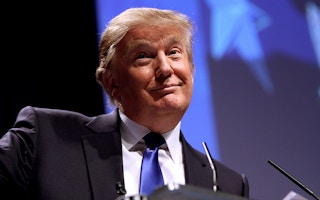Climate change is the single biggest challenge facing humankind. Yet the next president of the United States – the world’s second-largest greenhouse-gas emitter and a critical actor in climate policy – does not believe it is happening, or at least that humans have a role in driving it. If Donald Trump actually wants to “Make America Great Again,” as his campaign slogan declared, he will need to change his attitude and embrace the climate agenda.
To continue reading, subscribe to Eco‑Business.
There's something for everyone. We offer a range of subscription plans.
- Access our stories and receive our Insights Weekly newsletter with the free EB Member plan.
- Unlock unlimited access to our content and archive with EB Circle.
- Publish your content with EB Premium.
So far, the situation does not look promising. Despite a mountain of scientific data, Trump claims that there is no evidence that humans contribute to global warming. He once even called climate change a “hoax,” invented by the Chinese to make US manufacturing less competitive (though he later walked back that accusation). He has not, however, rethought his broader skepticism about human-driven climate change.
Reflecting this line of thinking, Trump has announced his intention to reverse carbon-emission limits for coal-fired power plants, step up fossil-fuel production, and roll back support for wind and solar power. He has also pledged to pull the US out of the global climate-change agreementconcluded last December in Paris. Such a reversal would be catastrophic for global efforts to tackle climate change.
Just as US President George W. Bush’s refusal to sign the Kyoto Protocol on climate change in 2005 initiated a spiral of rising emissions, a decision by Trump not to fulfill America’s commitments under the Paris agreement could spur others to follow suit.
After all, many countries are already worried about the costs of meeting their national commitments, especially at a time of sluggish economic recovery. And burning fossil fuels remains, in most economic activities, cheaper than using cleaner energy (when one does not account for the relevant environmental damage).
Of course, in the longer term, burning more fossil fuels will drive up health-care costs and impede worker productivity. Then there are the economic and human costs of increasingly frequent and severe climate-related disasters – including floods, droughts, storms, and heat waves, all of which are already on the rise worldwide.
To be sure, Trump recently met with the former US vice president and vocal climate activist Al Gore. Nonetheless, it seems unlikely that Trump will change his tune on climate change, not least because the cabinet members he has selected are largely singing the same song.
The good news is that he may not have to. In fact, there are actions that Trump can take for other ends – from boosting the US economy to enhancing America’s global influence – that would also advance the climate agenda.
The first such action is to increase investment in research and development in climate-friendly sectors, such as energy efficiency and storage, renewable-energy systems, and safer and smaller cars.
Technological breakthroughs in these areas – which the US is particularly qualified to realize – would be great for business. And building high-tech production and efficient energy sectors may be Trump’s best chance of fulfilling his campaign promise to create a large number of jobs for Americans.
As much as Trump might like to revive steel and coal in the so-called Rust Belt states that were crucial to his electoral victory, that is likely impossible (as is bringing back large numbers of manufacturing jobs from abroad). Indeed, coal power is already on its way out in the US, as health and environmental (not just climate) concerns force plants to shut down.
Natural-gas production, meanwhile, is at an all-time high; its 33 per cent share in power generation now exceeds that of coal. Renewable-energy sources and nuclear power are also on the rise, a trend that is almost certain to continue.
“
In fact, there are actions that Trump can take for other ends – from boosting the US economy to enhancing America’s global influence – that would also advance the climate agenda.
To create a Rust Belt revival, Trump must capitalize on these trends, advancing a more innovative, energy-efficient approach, much like the one that is helping to support growth in the economies of California and New York.
Trump could reinforce progress in dynamic and profitable energy-efficient industries by entrenching energy efficiency in construction codes. New buildings and other infrastructure should feature energy-efficient lighting (including better use of sunlight), heating, and air conditioning. There are also huge payoffs from retrofitting existing buildings for more efficient energy use.
There is one more key reason why Trump, the climate-skeptic, might be convinced to sustain progress on climate action: preserving and enhancing America’s international influence.
Other prominent global leaders – including Chinese President Xi Jinping, Indian Prime Minister Narendra Modi, and German Chancellor Angela Merkel – have expressed concern about the devastation caused by pollution and environmental degradation. If the US repudiates its leadership role in this area, it risks considerable reputational damage.
Global climate leadership will require the US, first and foremost, to fulfill its Paris commitments. It is vital that Trump upholds America’s Clean Power Plan, which establishes state-by-state targets for carbon-emissions reductions, with the goal of lowering national emissions from electricity generation by one-third relative to their 2005 level by 2030. The extension of tax credits for renewable-energy producers and consumers would go a long way toward advancing this goal.
But even achieving the Paris agreement’s goals will not be enough to avert a catastrophic rise in global temperature. We must overshoot our targets by advancing clean energy, clean transport, and clean industry. For that, American know-how and savvy will be indispensable.
Trump already wants to invest in energy and infrastructure. If he does so in a climate-friendly way, the US will reap enormous benefits – and so will the rest of the world. If the mogul-turned-president does not recognize the threat that climate change poses, he should at least be able to recognize a tremendous business opportunity when he sees one.
Vinod Thomas, a visiting professor at the National University of Singapore, is former Director General of Independent Evaluation at the World Bank.
© Project Syndicate 1995–2016









